Top News
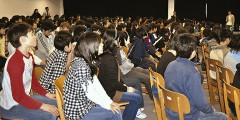
May 7, 2011 by Kumiko Hokama, a correspondent of the Ryukyu Shimpo
Himeyuri (2007), a full-length documentary, which ASIA Documentary Productions and the Himeyuri Alumnae Incorporated Foundation collaborated on to produce, was screened at Japanese International School Dusseldorf (principal: Yoichi Fukumori) in Germany .
One hundred eighty students from fifth-grade in elementary school to third-year in junior high school viewed the film. After intently watching the two-hour long documentary, the students expressed their appreciation of those survivors who related their experiences of the Battle of Okinawa, allowing the children to deepen their understanding of the history of Okinawa.
The film was screened in the Japan Cultural Institute in Cologne in 2010, which then led to two further screenings in Eko house in Dusseldorf. After watching it in Eko house, Hiromi Kida, the school’s executive officer, wanted the students to see it too, leading to the first screening of Himeyuri in a Japanese school overseas.
The students each reacted differently to the film. Many felt string feeling of respect towards the survivors, saying, “I am very grateful to those who talked about their experiences despite having been through such awful things.”
Other students said, “It was shocking that more than half of the Himeyuri Student Corps were killed even though they weren’t soldiers.” “It was cruel for them to be compelled to commit suicide” and “Okinawan people were caught up in an absolutely terrible battle all those years ago.”
Rika Iriomote, who is originally from Okinawa, but now teaches at the school in Germany, watched the film for the first time, saying, “It is really important for people like us who have never experienced the horrors war not to forget the courage and intensity of feeling of those who talked about their wartime experiences in Himeyuri. We need to keep this story going from one generation to the next. I think it is really heartening for us Okinawans to have someone like Mr. Kida convey the story of the Battle of Okinawa with such great passion.”
(English Translation by T&CT, Mark Ealey)
Go To Japanese

WikiLeaks discloses U.S. official telegrams
May 5, 2011. Ryukyu Shimpo
According to U.S. official telegrams disclosed by WikiLeaks, while the DPJ administration was seeking the relocation outside of Okinawa Prefecture of the U.S. Marine Corps now based at Futenma, a staff member of the Ministry of Foreign Affairs of Japan suggested to United States government officials that they should not compromise on the Futenma relocation plan. The cable indicates that both governments inflated the numbers involved in U.S. Marine Forces Transfer Plan from Okinawa to Guam. The Roadmap for Realignment Implementation agreed to by both governments in the spring of 2006 states that 8000 Marine Corps personnel and 9000 dependents would move to Guam, but leaked telegrams indicate that these numbers were inflated to optimize their political value.
To add to this, in order to make Japan’s share of the financial burden appear smaller, the United States included the cost of an unnecessary project in the calculation of the relocation expenses to Guam. The Japanese government accepted these figures in 2008.
The cables state that the total cost of relocation was inflated by including $1 billion for road construction, which meant that Japan’s share of the expense burden decreased from two-thirds of the total cost of $9.2 billion, to just under 60% of the inflated total.
The cables also include an example of a Japanese career bureaucrat recommending to United States officials that they stay on course with the Roadmap for Futenma relocation after the regime change to the Democratic Party of Japan. At an unofficial lunch meeting October 12, 2009, Director General of Bureau of Defense Policy Shigenobu Takamizawa is reported as warning the Assistant Secretary of State for East Asian and Pacific Affairs Kurt M. Campbell “against premature demonstration of flexibility in adjusting the realignment package.” The cables also reported that a counselor in charge of political affairs in the Ministry of Foreign Affairs of Japan made the basically the same remark to his counterpart of the U.S. Embassy in Tokyo. The cables therefore indicate that career bureaucrats moved to prevent the Hatoyama administration from seeking the relocation of the facilities at Futenma outside of Okinawa.
The Japanese Government explains that the number of U.S. Marines in Okinawa is set at 18000, leaving about 10000 after relocation to Guam, but the cables indicate that the number of Marines to be moved to Guam would fall short of 8000 and that 9000 was the expected absolute maximum number of dependents.
In 2006 the Marine Corps assigned personnel level in Okinawa was 13000, so the actual number of marines to move to Guam would have been much lower than 8000.
On December 21, 2009, directly after Prime Minister Hatoyama delayed his decision on the alternative location for the facilities at Futenma, Vice Minister Mitoji Yabunaka commented that, “Prime Minister Hatoyama confirmed that if the review of the Futenma Relocation Facility (FRF) alternatives to Henoko did not produce viable proposals, he would go back to the 2006 FRF agreement.”
The cable suggests that at an early stage Hatoyama was considering the Futenma facilities coming back to Henoko.
(English Translation by T&CT, Mark Ealey)
Go To Japanese
May 5, 2011 Ryukyu Shimpo
With regard to the cable disclosed by the whistleblower website WikiLeaks, which revealed that the U.S. and Japanese governments inflated the projected cost of the planned relocation of Marines from Okinawa to Guam and the number of personnel the move involved, peace organizations have criticized both governments, saying, “They deceived the people of Japan ,” and that, “The U.S. Government is the one that is a master of manipulation and extortion.”
Shikou Sakiyama, Chairman of the Okinawa Peace Movement Center, criticized both governments, saying, “I resent how the United States and Japanese governments have deceived the Okinawan people. Kevin Maher, former Director of Japanese Affairs in the State Department, was quoted as saying “Okinawans are masters of manipulation and extortion of Tokyo,” but those very same words apply to the U.S. government. The Japanese government, which has confirmed what Washington has done, is just as blameworthy as their U.S. counterparts. Japanese citizens should not tolerate what both governments have done.”
Shigenobu Arakaki, Chairman of the Okinawa Coalition, who had been suspicious about the veracity of the numbers of U.S. Marines being put forward, said, “both the U.S. and Japanese governments deceived Japanese citizens the same way as they did with secret pacts about the return of Okinawa, which clearly reflects how both countries have developed since World War II. Unless the people of Japan abandon the Japan-U.S. Security Treaty, we will not be able to establish our own sovereignty.”
Hiroshi Ashitomi of the Helicopter Base Objection Association insists that, “The Democratic Party of Japan insults Okinawa. They think that they can sacrifice Okinawa in order to lighten the load on the main islands of Japan. When deciding their future, the Okinawan people cannot expect anything from either the U.S. or Japanese governments. They must determine their own future.”
Mie Kunimasa, member of the anti-base women’s group, “Kamado guwaa no tsudoi” (“Meeting of the Kamados”), organized by housewives residing around Ginowan City, said, “The negotiations totally ignore the situation here. The Okinawan people don’t see the issue in terms of burden of expense or the number of military personnel; we simply ‘say no’ the existence of U.S. military bases in Okinawa. We need to keep raising the matter of the situation in Okinawa.”
(English Translation by T&CT, Mark Ealey)
Go To Japanese
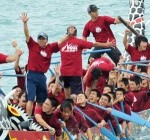
May 4, 2011. Ryukyu Shimpo
The 37th Naha Harii, a three-day dragon boat event, began on March 3 at Naha New Port wharf. On the first day, races were held in various sections including junior high school, PTA and adults. The timing of the competitors’ paddle work was perfectly synchronized as they gave it their all in their colorful dragon boats.
“We didn’t win our race, but it was still a lot of fun. We are sure that our juniors will be able to give it a really good go next year,” said 15 year-old Yurina Shinmori, third grade pupil of Oroku Junior High School, about her team’s performance in the junior high school girls’ section.
In the afternoon, the adult race was canceled part way through because of bad weather. Various other events such as a concert and fireworks are held during the Naha Harii. On May 4, the dragon boat on-board experience will be held, and the next day, the main Barii race and the Ugan Barii, dragon boat of prayer for the god of the sea will be held.
(English Translation by T&CT, Mark Ealey)
Go To Japanese
May 4, 2011 Tokyo
The Nerima Ward Office in Tokyo is encouraging people to grow goya, a bitter-tasting gourd that is a traditional summer vegetable in Okinawa, against walls or in windows in their homes as a form of protection against the summer heat. Helping to block out the sun and to lower the temperature, a cool breeze is generated by the water vapor from the leaves. The Green-Curtain operation is gaining momentum in Nerima Ward.
The Ward Office recommends this as a countermeasure to global warming that is readily available to residents and distributes two seedlings free to a thousand households or businesses.
A Green-Curtain using hechima or loofah plants has been promoted in Nerima Ward office buildings since 2009, and it is said that the heat mitigating effect has lowered temperatures by two or three degrees Celsius. The success of that Green-Curtain has seen the Ward Office kick off this new project.
The goya has been selected based on submissions from local residents. “Goya is popular among the people in Tokyo. It is a strong plant that is easy for a beginner to grow,” said Katsumi Sasaki, Head of the Nerima Ward Environmental Section, who expects it to be just as effective as the loofah vine in lowering temperatures. Many people have already registered their desire to receive the seedlings.
Registrations of interest close on May 9, and it is likely that great interest will mean that there will need to be a draw to distribute the plants. The shortage of electricity triggered by the accident at the Tokyo Electric Power Company Fukushima No. 1 Nuclear Power Plant has heightened interest towards the Green-Curtain Project.
(English Translation by T&CT, Mark Ealey)
Go To Japanese
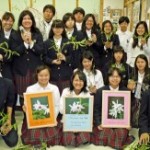
May 1, 2011, Ryukyu Shimpo
Students of the Okinawa Chubu Agricultural High School (Uruma City, Okinawa, principal: Mitsuo Gushiken) have created new hybrid orchids by crossing different wild varieties. These new orchids were registered with the Royal Horticultural Society in England, which is the International Registration Authority for plants such as conifers, clematis, daffodils, dahlias, delphiniums, dianthus, lilies, orchids and rhododendrons.
The students continued research that their seniors had initiated, taking a total of about four years to create the new orchids.
Hoping for the restoration of Japan following the Great East Japan Earthquake, the students registered the orchids’ names as “lequios kukuru (heart of Ryukyu),” “lequios south wind (south wind of Ryukyu)” and “lequios pearl white (pearl of Ryukyu).”
They produced these orchids by crossbreeding D. okinawense Hatusima et Ida, which is indigenous in the northern region of Okinawa and listed as an endangered species, with three different varieties of horticultural orchids.
The students registered the orchids on March 28.
Twenty-five sophomore and junior students majoring in bio-studies in the school’s horticultural science course grew the orchids and succeeded in getting them to bloom.
They discussed the naming of the orchids with former students before making a decision. Particularly, the name of “Lequios Kukuru,” which came into bloom just a day before the Great East Japan Earthquake, reflects their hope that all Japanese will be united and that Okinawan people could send their best wishes to the people in the disaster stricken areas.
Misaki Naka, a junior student of Chubu Agricultural High School, was pleased to comment, “I am glad that we succeeded in giving birth to some new hybrid orchids and registering them like this after we took over the project started by our seniors.”
Kazuki Matsumora, a junior student, said, “It was really difficult growing these new orchids. It is now our turn to pass the baton on to our juniors.”
Reiko Toyama, teacher in the horticulture science course said, “I think that we can protect wild orchids such as D. okinawense Hatusima et Ida by producing more new hybrid varieties. I hope that our students can help stop people taking plants from the wild by doing this kind of conservation activity that only high school students can do.”
Those new hybrid orchids are scheduled to be given away for free – 40 of “lequios pearl white” and 20 each of “lequios kukuru” and “lequios south wind” at the flower shop “Ranran” in Yamakawa, Motobe Town from 2:00pm on May 2.
(English Translation by T&CT, Mark Ealey)
Go To Japanese
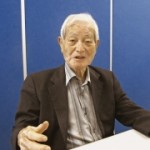
May 3, 2011 by Eriko Tamaki, Ryukyu Shimpo
The Okinawa Human Rights Association, formed for the protection of human rights for people in Okinawa under the U.S. military administration, and for education about and encouragement of awareness of civil liberties, marked the 50th anniversary of its establishment.
Despite coming under the “Peace Constitution,” which extols respect for basic human rights and the renunciation of war, since its reversion to Japanese sovereignty Okinawa has seen an endless stream of incidents and accidents related to the U.S. military bases.
The Japanese government is pressing forward with the transfer plan to Henoko, ignoring criticism from the Okinawan people, who call for the relocation out of the prefecture of facilities now located Futenma Air Station.
Hiroaki Fukuchi, Head of the Okinawa Human Rights Association, said, “Doesn’t the ‘Peace Constitution’ apply to Okinawa? Okinawa is still discriminated against by the Japanese government despite it being part of Japan.”
The Fight for human rights continues in Okinawa.
Before its reversion to Japan, Okinawa witnessed many U.S. military personnel who were either not charged despite committing violent crimes, and or were found not-guilty in military courts. In the days when Okinawan people required a passport to travel outside the prefecture, many who were judged by the U.S. military administration to be “undesirable” were not granted passports.
“Neither the Japanese Constitution nor the American Constitution apply to Okinawa. Okinawa has been put to the side. Through the years Okinawan people have cried themselves to sleep over human rights abuses they have experienced. It is a wasteland in terms of human rights issues,” said Fukuchi.
Fukuchi, who had a travel ban placed on him and was subjected to interrogation by the U.S. Counter Intelligence Corps, felt the need for the citizens to stand up and fight back.
In April 1961, when he was working for the Okinawa Teachers’ Association, which played a central role in the reversion movement, he appealed to the chief editor of Ryukyu Shimpo, Okinawa Times, attorneys and legislative authorities to come together to form the Okinawa Human Rights Association.
As soon as the Association was formed it received many cases to consider, among them those related to matters such as U.S. military personnel abandoning their wives and children, abuse of police powers, trafficking of female employees, and women falling victim to sexual assaults.
The Association received 500 cases in the first five years, and in particular, it played a vital role in the lawsuit in 1965 that Okinawa took in Tokyo District Court against the Japanese government during the period under the U.S. military administration, demanding that basic human rights be guaranteed by the Japanese Constitution,
With regard to the current situation in which so many U.S. military bases are concentrated in Okinawa, bringing with them risks that threaten the lives of local Okinawan people, Fukuchi commented that, “The Japan-U.S. Security Treaty sits above the Japanese Constitution.”
He continued, emphatically stating that, “Okinawan people are keenly aware of their human rights because they have been occupied by the United States and have had their rights violated through the years. They must continue to point out the issues surrounding the Japan-U.S. Security Treaty and the Japan-U.S. Status-of-Forces Agreement – matters that are difficult for the people of the main islands of Japan to grasp. For the sake of peace in East Asia, now is the time for the people of Okinawa to push forward their sense of international human rights.”
(English Translation by T&CT, Mark Ealey)
Go To Japanese
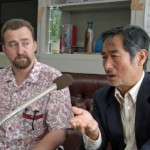
May 1, 2011 Ryukyu Shimpo
Fifty people of Okinawan descent and a number of government officials from New Caledonia, a special collectivity of France, will take part in the 5th Worldwide Uchinanchu Festival scheduled to be held in October 2011.
Four members of a family from New Caledonia participated in the previous Festival five years ago when on a trip to visit ancestral graves, but this is the first time for people from New Caledonia to take part in the Uchinanchu Festival just for the Festival itself.
New to the “Okinawan network,” Takeshi Miki, the president of Okinawa-New Caledonia Friendship Association and Miguel Da Luz, the vice president of the Association, hopes that this will be the start of cultural exchange, stating that “New Caledonia is an island and is subtropical, the same as Okinawa. New Caledonia also relies on tourism and karate is practiced, so I think that there is scope for active cultural exchange between Okinawa and New Caledonia.”
The Mayor of Poindimie, who is also Governor of Northern Region of New Caledonia, the Chief of the Cultural Affairs Agency and the Honorary Consul of Japan will also participate in the Festival.
Because the ancestors of many of the people of Okinawan descent in New Caledonia were from Nago, New Caledonia will request the establishment of a sister-city relationship with Nago City.
Poindimie Junior High School will seek to start cultural exchange with Yagaji Junior High School of Nago. Many people of Okinawan descent currently reside in Poindimie.
The French champion of karate kata, who is from New Caledonia, will also be invited to Okinawa in October and cultural exchange through karate will be held in New Caledonia next July.
Some 1500 people of Okinawan descent are estimated to reside in New Caledonia. Those people, who mainly live in Poindimie, formed an association of people from Okinawa in 2007, and have developed exchange with Okinawa through the Okinawa Friendship Association. This has led to people from New Caledonia participating in the 5th Worldwide Uchinanchu Festival this year.
New Caledonia began to accept immigrants from Okinawa in 1905. Although more than 800 people of Okinawan descent lived there as mine workers, during the Pacific War they were forcefully repatriated to Japan because they were seen as enemy nationals.
Miki said, “Many family members of people of Okinawan descent want to find out about the roots of their fathers, who were sent back to Japan. I would like those people to use this opportunity to do so.”
(English Translation by T&CT, Mark Ealey)
Go To Japanese
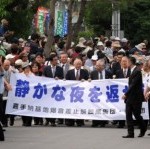
Residents around Kadena Air Base submit third lawsuit seeking to stop nighttime flights
April 28, 2011
Residents living near the U.S. Kadena Air Base in Okinawa filed a lawsuit at the Okinawa Branch of the Naha District Court on April 28, seeking a ban on flights from night to early morning to reduce noise. They are also claiming compensation from the Japanese government on the basis that their health has been affected by aircraft noise.
This legal action has the largest number of plaintiffs involved against the U.S. military – 22,058 people living in five municipalities, including Okinawa City, Kadena Town, Chatan Town and other places around the Kadena base.
About 35 percent of residents of Kadena Town participated. The plaintiffs demand that the government ban the landing of aircraft from 7:00pm until 7:00am next day, and claim compensation for damage caused by past and future noise pollution, seeking to prove that there is a causal connection between the activities of the air base and residents’ hearing loss and other health issues. Some 400 plaintiffs visited the Okinawa Branch of the Naha District Court to voice their determination.
Shuusei Arakawa, the head of the plaintiffs, said, “We are frustrated that the government does not understood the pain and suffering that it has inflicted upon us. We want to voice this again during the trial.”
“We are to take a step that will be noted in the history of Okinawa,” said Toshio Ikemiyagi, leading attorney, demonstrating his determination to put an end to the flights.
In sentences handed down in similar cases in the past, including the second Kadena suit, calls for the suspension of flights have been dismissed, but compensation for damages to plaintiffs has been accepted for all regions that recorded an annoyance index of 75 decibels or above.
(English Translation by T&CT, Mark Ealey)
Go To Japanese
Ryukyu Shimpo Editorial: Open letter dated April 27, 2011 to Mr. Carl Levin, Chairman of the Senate Armed Services Committee.
Dear Friends of the U.S. Congress,
We recommend that the United States Government implement a dramatic change in policy and remove the facilities at Futenma Air Station from Okinawa altogether. The people of Okinawa are both hopeful and anxious as they wait to see how American democracy handles this test.
Do we want a situation in which every time the United States sneezes, Japan follows; in which if the United States orders Japan to turn to the right that is exactly what happens? Or do we want a situation in which both parties respect each others’ opinions and do not hesitate to state their position on matters, however difficult that may be. Which kind of U.S.-Japan relations would you prefer?
Dear Mr. Carl Levin, Chairman of the Senate Armed Services Committee and Mr. Jim Webb, Chairman of the Senate Foreign Relations Subcommittee on East Asia and Pacific Affairs,
We appreciate that the two of you, both representatives of the U.S. Congress, are visiting Okinawa and hope that you have opportunities to engage in dialogue with many local people during your stay.
In the 66 years that have passed since the end of World War II, the United States has been a teacher of democracy for the people of Okinawa both through positive and negative examples.
Throughout our long-standing relationship, the people of Okinawa have been sincere in raising the matter of how the United States and Japan should seek to create a genuine friendly relationship in which both countries respect human rights.
Ongoing humiliation – patience wears thin
April 28 is the date when the United States and Japan concluded both the San Francisco Peace Treaty and the Japan-U.S. Security Treaty in 1952. With this, Allied Occupation forces withdrew from Japan and Japan attained independence. The San Francisco Peace Treaty determined that Okinawa and Amami Oshima would be separated from the mainland islands of Japan and put under the control of the U.S. military.
After the war, Okinawa faced many trials and tribulations during the reign of the U.S. military government, which took control of Okinawan people’s land at the point of a bayonet and used bulldozers to build military bases. They blatantly violated the basic human rights of the local people with outrageous behavior and placed limitations on Okinawa’s autonomy.
The people of Okinawa see April 28 as a day of humiliation. Notwithstanding their normally placid temperament, their patience has been worn thin by ongoing humiliation at the hands of the U.S. military.
The problem is symbolized by the problems surrounding the return of the Futenma Air Station. In April 1996, the Japanese and U.S. governments agreed that the United States would return the land used by Futenma Air Station, which is located in a densely populated area, to Okinawa on the basis that the facilities would be moved to an alternative location within the prefecture. However, local Okinawans have consistently opposed the construction of such replacement facilities.
The Governor of Okinawa Hirokazu Nakaima and all the heads of the various municipalities of Okinawa are opposed to the agreement reached by the Japanese and U.S. governments by which the U.S. military would relocate the Futenma Air Station facilities to a coastal area of Nago City. Okinawa’s prefectural assembly passed a resolution calling for the Futenma Air Station to be relocated out of the prefecture or out of Japan altogether, and in the national election, all politicians who accepted the option of relocation of the air station within the prefecture lost their seats.
In an opinion poll carried out in Okinawa last May, following the U.S.-Japan agreement, 84% of respondents opposed the relocation of the facilities at Futenma to Nago City’s Henoko district.
When asked by Secretary of State Hillary Clinton about his view of the Futenma issue, former Director of the Japanese Affairs Office in the U.S. State Department, Kevin Maher, commented that in the worst case scenario the U.S. should maintain the status quo, which would neither pose a problem for its military nor be detrimental to the interests of the United States.
This is an irresponsible stance. The U.S. government is a central player in this matter and should feel guilty for neglecting what is clearly a dangerous situation.
Okinawan people feel that they were sacrificed in the name of defense of the main islands of Japan during the Battle of Okinawa and that the same occurred after the war in the Japan-U.S. Security Treaty. They also feel that an underlying structural discrimination exists towards them.
Although Okinawa only accounts for 0.4% of the land area of Japan, 74% of U.S. military facilities in Japan are located in Okinawa and 70% of U.S. military personnel in Japan are stationed in the prefecture.
U.S. military and the Self-Defense Forces carried out Operation Tomodachi following the Great East Japan Earthquake of March 11. The people of Japan are grateful for the efforts of the U.S. military in transporting relief aid, clearing rubble, and restoring Sendai Airport to a situation in which it could function again.
While we Japanese salute the dedication of U.S. military personnel, the excessive burden placed on Okinawa by the presence of U.S. bases and the ongoing unwelcome behavior of U.S. military personnel overshadows those positive feelings.
Even after Okinawa’s reversion to Japanese administration in 1972, residents of Okinawa have continued to be on the receiving end of incidents, accidents and crimes involving U.S. military personnel.
Hazy ideal of the Obama Administration
Since the reversion, there have been about 500 accidents such as crashes and emergency landings involving U.S. military aircraft. Military personnel have committed over 5500 crimes, 560 of which involved acts of violence. It is likely that many female victims end up crying themselves to sleep without ever reporting what has happened to them, so the figures are potentially even higher than this.
The Okinawan people see the Japan-U.S. Status-of-Forces Agreement, which grants a privileged status to the U.S. military forces in Japan, as an unequal treaty, and therefore seek fundamental revisions to this Agreement. This is the collective will of the Okinawan people.
Recently, a U.S. civilian employed by the military caused a fatal accident but was exempted from prosecution because the accident was judged to have occurred when he was “on duty.”
Such disregard for human lives and human rights by both the U.S. and Japanese governments based on the Japan-U.S. Status-of-Forces Agreement is unconscionable.
President Obama’s coming into office gave the Okinawan people great hope that “change” would occur. They wondered how Okinawa would be affected by the transition from the unilateralism of the Republican Party to policies of international cooperation and by President Obama’s advocacy of “a world without nuclear weapons.”
Among the ideals espoused by President Obama and in the new challenges that he took up, the people of Okinawa sensed that there may be benefits for mankind that involve sustainable development and transcend America’s own national interests.
However, it would seem that military logic has come to overshadow these ideals.
The sea off Henoko is precious in that it is the natural habitat of the dugong, which is a protected species. If the governments of the United States and Japan push through the construction of a new base, the U.S. military will not only find itself surrounded by hostility from the people of Okinawa and mainland Japan, but also from members of conservation movement groups all over the world. We consider that the closure and removal of the facilities at Futenma is necessary to rebuild good neighborly relations between the U.S. and Okinawa and we hope that you sense and accept the sincerity of the “spirit of Okinawa.”
To respect the will of the people of Okinawa, please show us the true worth of American democracy and demonstrate to us the determination to make major changes to the Agreement between U.S. and Japan as it pertains to Futenma.
(English Translation by T&CT, Mark Ealey)
Go To Japanese
April 25, 2011. Ryukyu Shimpo
In the morning of April 25, Japan time, 13-year old Miyu Kaname, a Kamimori junior high school student from Urasoe City in Okinawa who was diagnosed with restrictive cardiomyopathy requiring a heart transplant to save her life, successfully underwent the transplant operation at Columbia University Hospital in New York. The good news was conveyed to Takashi Funakoshi, co-leader of the “Save Miyu-chan” executive committee from Miyu’s family members with her in the United States.
With an organ donor being found, Miyu entered the operating theater at 5:30am on April 25. Japan time. Surgery commenced at 8:00am and finished 11:30am, when she was transferred to the Intensive Care Unit. “Her new heart is functioning well,” a family member said.
(English Translation by T&CT, Mark Ealey)
Go To Japanese







 Webcam(Kokusai Street)
Webcam(Kokusai Street)


